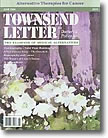


June 2004
An Ounce of Prevention
by Alan R. Gaby, MD
As demonstrated in this issue of the Townsend
Letter, a number of important advances have been made in the treatment
of cancer; advances
that have the potential to increase survival times, improve quality
of life and, in some cases, cure the disease. The stark reality, however,
is that a large proportion of people with cancer are still succumbing
to it, despite the best that modern medicine has to offer. Consequently,
the best strategy available to avoid dying from cancer is not to develop
it in the first place.
A considerable body of evidence indicates that many common cancers are caused
in large part by environmental and lifestyle factors, and that modification
of those factors can significantly reduce the risk of developing cancer. Following
is a brief discussion of some relatively simple lifestyle changes that might
help prevent cancer.
Avoid excessive sunlight exposure
Being out in the sun too long can increase the risk of melanoma (a form of
skin cancer that is often fatal), as well as non-melanoma skin cancers. Light-skinned
individuals are particularly susceptible to the adverse effects of ultraviolet
rays. On the other hand, sun exposure is needed to stimulate the formation
of vitamin D and possibly certain pineal-gland hormones. The amount of sun
exposure required to produce adequate amounts of vitamin D varies with skin
color, season, latitude, and time of day. Exposure of the face, hands, and
arms to one-quarter the amount of sunlight needed to cause a minimal amount
of skin redness has been suggested to be the amount needed to maintain adequate
vitamin D status. Exposure to the point of suffering sunburn, on the other
hand, is clearly too much. Ingestion of nutrients such as lycopene, beta-carotene,
vitamin E, vitamin C, and fatty acids from fish oil might help prevent sunburn.
Don't overcook your
food
A number of carcinogenic compounds, such as heterocyclic amines and polyaromatic
hydrocarbons, are formed when foods are heated to very high temperatures.
Of particular concern are charbroiled and fried meat and chicken. The amount
of carcinogens ingested can be reduced by cutting away the char that forms
during cooking or by reducing cooking temperatures. A grill called "Safe
Grill" uses a special filter between the fire and meat to block the
formation of both heterocyclic amines and polyaromatic hydrocarbons.
Keep processed-meat intake to a minimum
Processed meats, such as bacon, bologna, salami, sausage, and processed ham,
usually contain nitrites, which can be converted in the stomach into nitrosamines.
There is good evidence that nitrosamines are an important cause of stomach
cancer. The conversion of nitrites to nitrosamines is inhibited by ascorbic
acid, so taking vitamin C or drinking orange juice at the same meal as your
bacon or your beef jerky might help minimize the damage.
Avoid soft-plastic beverage containers
Many beverages and some foods are packaged in soft-plastic containers. These
containers leach compounds into the food or beverage that have estrogenic
or antiandrogenic activity, and which may increase the risk of hormone-dependent
cancers. Harder plastic containers do not appear to leach these chemicals.
Food wrapped in plastic should never be heated in a microwave oven, as doing
so greatly increases the migration of chemicals into the food.
Eat lots of fruits, vegetables, whole grains
Numerous epidemiological studies have indicated that eating these foods decreases
the risk of developing many different types of cancer. Cruciferous vegetables
(e.g., cabbage, Brussels sprouts, broccoli, cauliflower, turnip, rutabaga,
kale, collard, radish, and others) appear to be particularly potent anti-cancer
foods, but other vegetables and fruits have also demonstrated cancer-fighting
activity. Whole grains contain many important micronutrients, as well as
fiber. While studies examining the relationship between fiber intake and
colon cancer are conflicting, the results are consistent with the possibility
of a 10% reduction in risk attributable to the consumption of a high-fiber
diet.
Avoid scorching-hot beverages
There is evidence that ingesting very hot drinks increases the risk of developing
esophageal cancer, presumably as a consequence of repeatedly burning the
esophageal tissues.
Don't smoke
Almost everyone knows by now that smoking is the major cause of lung cancer
and also is an important risk factor for oral cancers. Surprisingly, some
people who are not willing to quit smoking because of the threat of lung
cancer find a way to quit after being told that smoking cigarettes causes
wrinkles.
Get regular aerobic exercise
Exercise stimulates the immune system, which plays a key role in preventing
cancer. Numerous studies suggest that people can reduce their risk of developing
many types of cancer by participating in regular aerobic exercise. In addition,
exercise helps prevent or reverse cardiovascular disease, diabetes, hypertension,
osteoporosis, depression, anxiety, and fatigue.
Take micronutrient supplements
Research on the relationship between micronutrient intake and cancer has been
done mainly in vitro and in animals, although some human research has been
published. While more human studies need to be done, the available evidence
suggests that B vitamins, vitamin C, vitamin D, zinc, selenium, lycopene,
and other nutrients may help prevent cancer. The main caveat with regard
to micronutrient supplementation is that beta-carotene supplements have been
found to increase the risk of lung cancer among smokers. Consequently, people
who smoke should not take beta-carotene supplements.
While following the recommendations in this article will by no means guarantee
a lifetime free from cancer, it will almost certainly reduce the risk, perhaps
substantially.
Alan R. Gaby, MD
Search
our pre-2001 archives
for further information. Older issues of the printed magazine are also
indexed for your convenience.
1983-2001
indices ;
1999-Jan. 2003 indices
Once you find the magazines you'd like to order, please use our
convenient form, e-mail subscriptions@townsendletter.com,
or call 360.385.6021 (PST).
All rights reserved.
Web site by Sandy Hershelman Designs

